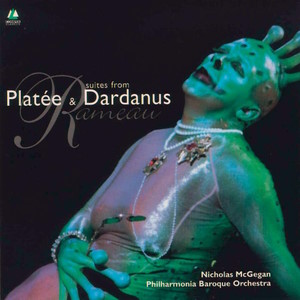
Jean-Philippe Rameau (1683-1764)
Suite from Platée (1745)
Suite from Dardanus (1739)
Philharmonia Baroque Orchestra/Nicholas McGegan
rec. June 1997, Skywalker Ranch, Nicasio, USA
Presto CD
Conifer Classics 75605513132 [74]
Nicholas McGegan’s sets of Rameau suites were recorded back in 1997 and have now been reissued by Presto. At the time, there was competition – and there still is – though not direct competition (as the selection of the suite movements differ) – with John Eliot Gardiner, whose Dardanus selection on Erato is much more extensive at 58 minutes. Platée has always been the less popular and less recorded work, especially when hunting for excerpts. There have obviously been a number of recordings of the full scores of both operas over the years.
McGegan and the Philharmonia Baroque Orchestra play a 17-track selection from Platée, which is more extensive than that of Roy Goodman and theEuropean Union Baroque Orchestra on Naxos, who play only seven in their recording, made in 1999 but only released in 2005. Goodman adds an 11-track selection from Dardanus but sandwiches between these works music from Pigmalion. This is probably the most obvious competitor to the two-work McGegan disc.
I’d go for McGegan. His performances have clarity, direction, pointed rhythm and sonorous textural warmth. Not that Goodman is lacking in many respects but there’s an extra quotient of reportorial familiarity from the Philharmonia Baroque and a generous sense of sheer engagement too – sample the percussion in the Contredanse (en Rondeau) of Platée or the croaking frog life in the Passepieds (deftly sketched, not overdone), the fast and fiery Orage, the drone effects in the Minuet or the delicious pointing in the Airs. The piccolo (is it Stephen Schultz?) is one of the stars of the serio-comic concluding Chaconne, for which McGegan has constructed his own brief concert ending.
Whereas Platée was written for a royal marriage, Dardanus was written on an antique theme with a libretto that mixed and matched the grand with the absurd. Some of these elements survive in the concert suite McGegan has fashioned. His Overture is every bit as gracious as Rameau requests, and the band plays with adroit period-instrument poise and panache, never spurning an opportunity to characterise the music with rhythmic vigour. I prefer their performance, and also the recording, to Gardiner’s putative competitor on Erato; McGegan sounds more incisive and receives a richer recording. Le Somneil, one of the work’s highlights, is beautifully poised in this reading, and the avian chirping in the Tambourins matches the boldness of orchestral attack in Le Monstre sortant des flots.
This authoritative and generous selection drawn from the two operas may inspire you to acquire the complete works but if you don’t, you can be assured of charm, wit, beautiful playing and a recording to match.
Jonathan Woolf
Help us financially by purchasing from



















